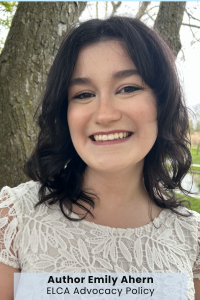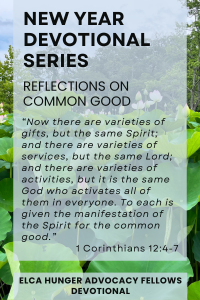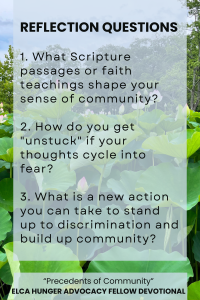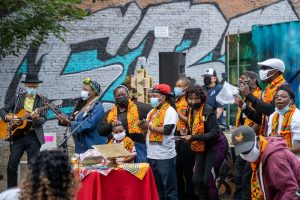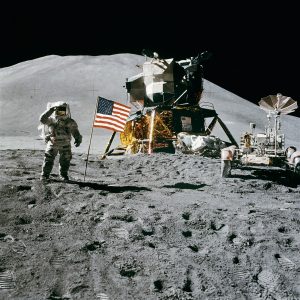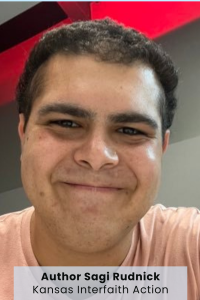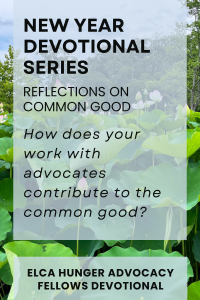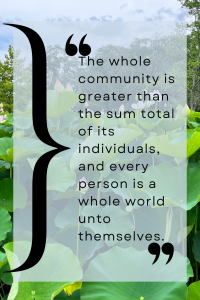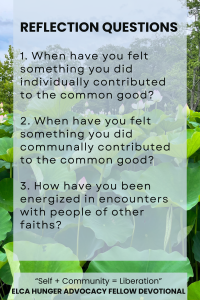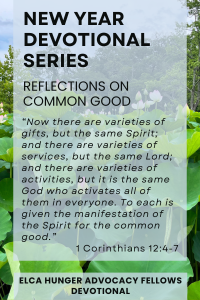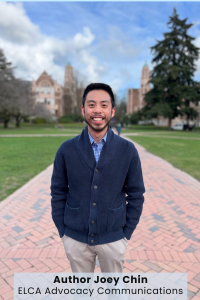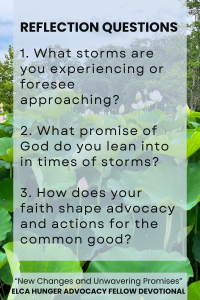from the ELCA advocacy office in Washington, D.C. – the Rev. Amy E. Reumann, Senior Director
CONTINUING RESOLUTION IMPACTS | COP29 CONCLUDES | PREVENTING ARMS SALES TO SUDAN | H.R.9495 AND NONPROFIT TAX-EXEMPTION | FY25 BUDGET AND THE HOMELAND SECURITY BILL
 CONTINUING RESOLUTION IMPACTS: In December 2024, Congress passed a three-month Continuing Resolution (CR) to keep the government temporarily funded through March 14, 2025, while additionally providing about $110 billion in emergency disaster relief and farm aid. The measure also extended the lapsed authorization of the Farm Bill through Sept. 30, 2025. Lawmakers will be working to address at the end of January an expiring debt ceiling limit, while needing to quickly pivot to resolve the federal budget under new Republican majorities in the House and Senate.
CONTINUING RESOLUTION IMPACTS: In December 2024, Congress passed a three-month Continuing Resolution (CR) to keep the government temporarily funded through March 14, 2025, while additionally providing about $110 billion in emergency disaster relief and farm aid. The measure also extended the lapsed authorization of the Farm Bill through Sept. 30, 2025. Lawmakers will be working to address at the end of January an expiring debt ceiling limit, while needing to quickly pivot to resolve the federal budget under new Republican majorities in the House and Senate.
Why It Matters to the ELCA
Within the budget, housing and homeless advocates are concerned that continued flat-level funding for Department of Housing and Urban Development (HUD) programs after many CR delays will start to put constraints on critical affordability and shelter programs, which are seeing increased housing costs and need extra funding to renew existing efforts. Federal agencies may soon need to stop renewing some vouchers and shelter contracts each week if a full budget isn’t reached – which could impact our wider ministries active in serving those of us who are displaced and in need of a home.
Many of our congregants and churches, and neighbors we serve, are dependent on the critical policies passed in the Farm Bill – including clarity on agriculture policy, farm disaster relief, rural development and support for emergency food assistance such as SNAP. Continued delays and lack of certainty could pose critical challenges to our communities, especially for those of us jeopardized by absence of clear policy and support.
What’s Next
The ELCA has an active Action Alert urging Congress to support critically underfunded housing and homeless programs, and is working with relevant lawmakers to ensure a disaster supplemental is passed for people displaced by recent hurricanes. As activity on the Farm Bill moves to the 119th Congress, look to the ELCA Farm Bill Updates page on the ELCA Advocacy Blog as our advocacy staff monitors developments.
 COP29 CONCLUDES: After two weeks of negotiations in Baku, Azerbaijan, during the UN Climate Summit (COP29), world leaders reached agreement about an updated commitment to deliver urgently needed climate finance to developing countries for greenhouse gas mitigation and climate adaptation and resilience. ELCA leaders in-person and virtually participated in a faith delegation. COP29 output also included agreement on the final structural elements of the Paris Agreement provisions concerning carbon markets (Article 6). On finance, negotiators adopted language that requires developed countries to contribute $300 billion each year by 2035 for climate action in the developing world, and at the same time for all countries to work together to scale up financing from all sources to $1.3 trillion per year by that same date.
COP29 CONCLUDES: After two weeks of negotiations in Baku, Azerbaijan, during the UN Climate Summit (COP29), world leaders reached agreement about an updated commitment to deliver urgently needed climate finance to developing countries for greenhouse gas mitigation and climate adaptation and resilience. ELCA leaders in-person and virtually participated in a faith delegation. COP29 output also included agreement on the final structural elements of the Paris Agreement provisions concerning carbon markets (Article 6). On finance, negotiators adopted language that requires developed countries to contribute $300 billion each year by 2035 for climate action in the developing world, and at the same time for all countries to work together to scale up financing from all sources to $1.3 trillion per year by that same date.
Why It Matters in the ELCA:
The ELCA staff members present at COP29 engaged across governments, the United Nations and alongside other faith communities to call for increased climate action. The faith community had a strong presence at COP29 in several ways: hosting a Faith Pavilion, official UN side events and some demonstrations to highlight the call to action. There was collaboration between the faith community and the negotiators that highlighted the importance of the faith voice and presence here considering reluctance from countries toward taking action.
What’s Next:
The outlook for continued U.S. federal participation in international climate action looks bleak, but states and local governments in attendance were clear and steadfast in their commitment to continue delivering on the goals of the Paris Agreement using all means available to them. The private sector was also fully engaged and made similar statements about climate action not being solely, or even primarily, determined by how the next U.S. administration proceeds.
 PREVENTING ARMS SALES TO SUDAN: Sen. Chris Van Hollen (D-MD) has introduced legislation and a joint resolution of disapproval in response to the United Arab Emirates’ (UAE) material support for the Rapid Support Forces (RSF). The joint resolution of disapproval (S.J. Res.118) is a companion to legislation (H.R.8501) already introduced by Rep. Sara Jacobs (D-CA), Ranking Member of the House Subcommittee on Africa. Jacobs’ bill would prohibit U.S. arms sales to the UAE until the Biden administration can certify that the UAE is no longer providing material support to the Rapid Support Forces (RSF) in Sudan. The Joint Resolution of Disapproval would block a specific $1.2 billion arms sale to the UAE due to its role in arming the RSF.
PREVENTING ARMS SALES TO SUDAN: Sen. Chris Van Hollen (D-MD) has introduced legislation and a joint resolution of disapproval in response to the United Arab Emirates’ (UAE) material support for the Rapid Support Forces (RSF). The joint resolution of disapproval (S.J. Res.118) is a companion to legislation (H.R.8501) already introduced by Rep. Sara Jacobs (D-CA), Ranking Member of the House Subcommittee on Africa. Jacobs’ bill would prohibit U.S. arms sales to the UAE until the Biden administration can certify that the UAE is no longer providing material support to the Rapid Support Forces (RSF) in Sudan. The Joint Resolution of Disapproval would block a specific $1.2 billion arms sale to the UAE due to its role in arming the RSF.
Why It Matters in the ELCA:
Commitment to peacemaking “in all times and places” is a core Lutheran value expressed in For Peace in God’s World (p. 1). In April 2023, fighting between rival Sudanese Armed Forces (SAF) and the paramilitary RSF erupted, resulting in the displacement of more than 11 million people. Successive U.S.-led peace negotiations have failed to stop the ongoing war. There have been multiple reports indicating that the UAE is providing weapons to the paramilitary group RSF. The war has led to catastrophic humanitarian crisis, leaving half of the Sudanese population in need of humanitarian assistance and protection.
What’s Next:
Sen. Van Hollen and Rep. Jacobs are seeking additional co-sponsors of the bills to generate support for it in Congress. Advocacy staff will work to generate congressional support and push for change of U.S. policy that turns a blind eye to the flow of weapons from abroad into Sudan.
 H.R.9495 AND NONPROFIT TAX-EXEMPTION: On Nov. 21, H.R.9495, the “Stop Terror Financing and Tax Penalties on American Hostages Act” passed in the House of Representatives. H.R.9495 would give the secretary of the Treasury unilateral power to designate nonprofits as suspected “Terrorist Supporting Organizations,” taking away their tax-exempt status unless they are able to prove they are not terrorist supporting. Originally on Nov. 12 this bill had been brought to the floor of the House under a different set of rules requiring a two-thirds majority but failed. The vote on Nov. 21 required only a simple majority. ELCA advocacy staff along with numerous other non-profit organizations have forcefully advocated against the passage of this bill which is seen as extremely dangerous to any organization with non-profit status.
H.R.9495 AND NONPROFIT TAX-EXEMPTION: On Nov. 21, H.R.9495, the “Stop Terror Financing and Tax Penalties on American Hostages Act” passed in the House of Representatives. H.R.9495 would give the secretary of the Treasury unilateral power to designate nonprofits as suspected “Terrorist Supporting Organizations,” taking away their tax-exempt status unless they are able to prove they are not terrorist supporting. Originally on Nov. 12 this bill had been brought to the floor of the House under a different set of rules requiring a two-thirds majority but failed. The vote on Nov. 21 required only a simple majority. ELCA advocacy staff along with numerous other non-profit organizations have forcefully advocated against the passage of this bill which is seen as extremely dangerous to any organization with non-profit status.
Why It Matters in the ELCA:
Due to the ELCA’s non-profit status and its work and relationships in the Middle East, and specifically with the Palestinian community, the passage of this bill in the House is extremely concerning. It is concerning to give unilateral authority to the IRS, which carries out the responsibilities of the secretary of the Treasury, to be able to strip a non-profit of its legal status without due process or providing clear evidence of material support to terrorism. Such legal authority could easily be misused for political and/or ideological reasons.
What’s Next:
This bill will likely be brought up in the Senate of the 119th Congress in January/February 2025. Our ELCA advocacy staff will continue to build and work with a faith-based coalition to push against this bill’s passage.
 FY25 BUDGET AND THE HOMELAND SECURITY BILL: In mid-November, Senate Democrats released the FY25 Homeland Security bill. This bill is one of the most polarizing in Congress, touching on border security, immigration, disaster funding and more. The released bill includes funding to Custom and Border Protection’s (CBP) Shelter and Service Program and immigration backlog reduction, and an increase in overall funding for CBP detection and border security.
FY25 BUDGET AND THE HOMELAND SECURITY BILL: In mid-November, Senate Democrats released the FY25 Homeland Security bill. This bill is one of the most polarizing in Congress, touching on border security, immigration, disaster funding and more. The released bill includes funding to Custom and Border Protection’s (CBP) Shelter and Service Program and immigration backlog reduction, and an increase in overall funding for CBP detection and border security.
Why It Matters in the ELCA:
Decisions around the budget have a profound impact on policy. The ELCA supports a generous policy of welcome for refugees and immigrants. Providing these important resources through the budget make our system fairer and more efficient, for those currently navigating it such as DACA, TPS, permanent residents, temporary workers and others as well as people are arriving to seek safety in the United States such as refugees and asylum-seekers.
What’s Next:
Action is still needed to pass robust funding in migration related federal accounts. This includes the Homeland Security bill, but also Health and Human Services and State and Foreign Operations. An Action Alert has been recently updated, encouraging constituents to voice their support for robust funding in 2025.
Receive monthly Advocacy Connections directly by becoming part of the ELCA Advocacy network – http://elca.org/advocacy/signup , and learn more from elca.org/advocacy .
 Consider Luke 5:1-11. In that story, Jesus meets a few fishers at a lakeshore. They’ve had what felt like a wasted day. Lots of casting out nets and nothing to show for it, not even a handful of minnows. Yet, Jesus–who was a carpenter, not a fishermen–tells them to try one more time. That certainly seemed like a futile task; they’d been fishing this spot for hours, after all! Yet, with Jesus by their side, what seemed like a wasted day became a trophy-worthy trip to sea. Because Jesus turned their waste into abundance, people could eat their fill. In God’s company, what once seemed useless can become miraculous.
Consider Luke 5:1-11. In that story, Jesus meets a few fishers at a lakeshore. They’ve had what felt like a wasted day. Lots of casting out nets and nothing to show for it, not even a handful of minnows. Yet, Jesus–who was a carpenter, not a fishermen–tells them to try one more time. That certainly seemed like a futile task; they’d been fishing this spot for hours, after all! Yet, with Jesus by their side, what seemed like a wasted day became a trophy-worthy trip to sea. Because Jesus turned their waste into abundance, people could eat their fill. In God’s company, what once seemed useless can become miraculous.

